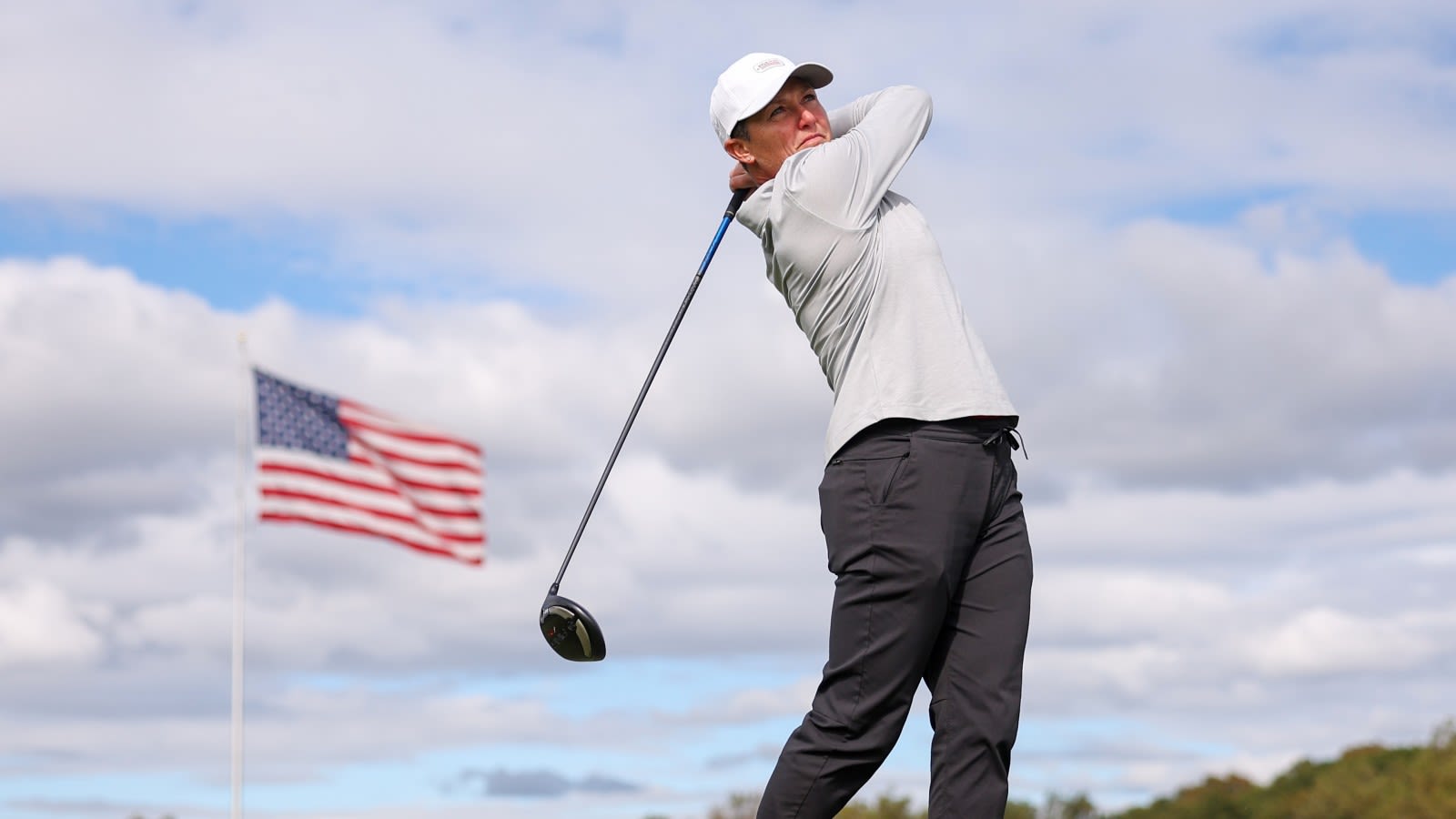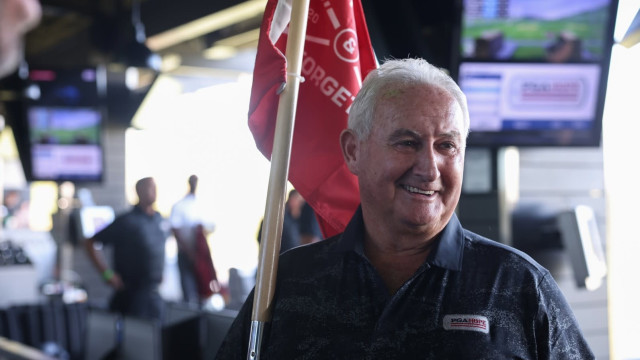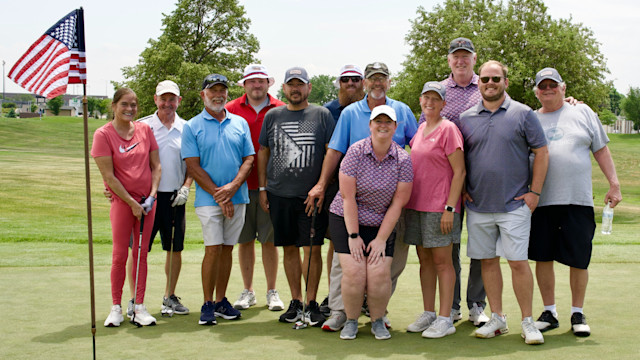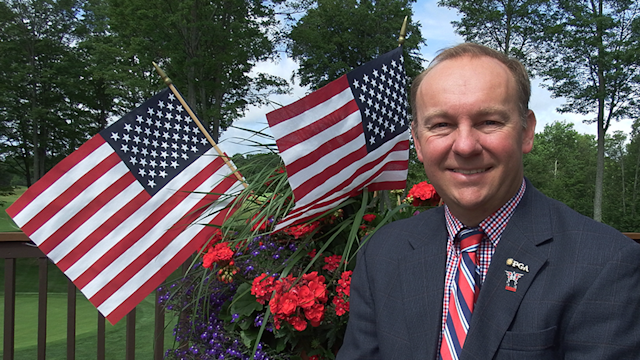Game Changers
How a Lifelong Love for Golf Led Air Force Veteran Colleen McBratney to PGA HOPE
By Jay Coffin
Published on

Colleen McBratney at PGA Hope National Golf & Wellness Week.
You can gauge Colleen McBratney’s level of happiness simply by asking her how much golf she’s been playing.
“Looking back at it now, golf really has always been a good barometer of my own health and wellness,” says McBratney, the first female orthopedic surgeon to reach the rank of Colonel in the Air Force. “When I look back at my career I could tell you, at each place that I was stationed, how my life was going based on how much golf I was getting to play.”
These days, McBratney, who retired two years ago, is at Tucson Country Club in Arizona as many as five days a week, fine-tuning her game and her body for a run at achieving her next golf goals: to qualify for either the U.S. Senior Women’s Amateur or U.S. Senior Women’s Open. In fact, when asked her age, she even relates that to her goal, saying, “I’m a year too young to play senior women’s amateur golf.”
This week McBratney, 49, is representing the Southwest PGA Section as one of 20 Veterans (pictured above) selected to participate in PGA HOPE National Golf and Wellness Week in Washington, D.C., hosted by Congressional. PGA HOPE (Helping Our Patriots Everywhere) is a flagship military program of PGA REACH, the charitable foundation of the PGA of America. PGA HOPE introduces golf to Veterans and Active Duty Military to enhance their physical, mental, social and emotional well-being.
“Watching the courage that I’ve seen other Veterans in PGA HOPE have to take care of themselves after their service has inspired me to have the courage to do the same,” she says.
Finding golf at all turns of life
McBratney was born in California but moved around as a youth before settling in Tulsa, Oklahoma during high school. She first started playing golf as a freshman and vividly recalls finishing last in her first competitive tournament and shooting 151. Four years later she was runner-up in the high school state championship.
Legendary Tulsa women’s golf coach Dale McNamara invited McBratney to walk onto her team but she had bigger plans and knew that she wanted to become a surgeon. A friend of McBratney’s played basketball at the Air Force Academy and told her that she’d love everything about the vibe in Colorado Springs. So she headed there to play on the golf team while earning an education. Only one of those two things happened.
“During basic training they cut the women’s golf team,” McBratney remembers. “But I always said, if I go to the Academy I promised myself I would not quit.
“So I was there, we’re doing marching and basic training and I’m looking out at the beautiful athletic fields and I’m thinking, ‘I could hit my 7-iron a long way out there.’”
McBratney graduated from the Air Force Academy in 1996 and after four years of med school, she moved to San Antonio for another five years of residency. The golf course at Lackland Air Force Base was just down the street, beyond the parade field from hospital. She’d head there as often as possible to practice and would take a bag of balls to dial in distances with her wedges. It was there when she learned there was an Air Force golf tournament.
In fall of 2001, McBratney participated in that championship and finished second, which qualified her for the Armed Forces golf event the next week in Santa Barbara, California.
“I had to call back to my program director and say, ‘Sir, can I stay another week, I just made the team,’” McBratney recalls. “The rest of my five-year residency I took grief for that.”
There were plenty of times during her 25-year career when golf was not as high of a priority. She wasn’t particularly fond of her time in Alaska from 2010-13 for multiple reasons and while deployments to the Middle East and Pacific Theater were considered highlights because “that’s where you were really connected to the operational mission,” it rarely was possible to go hit a bag of balls to blow off steam.
During McBratney’s career, among other impressive duties, she cared for 27 different sports teams at the Air Force Academy and later focused her sports medicine expertise on the Special Warfare’s Pararescue community, as well as fighter pilots within Air Combat Command. She ended her career having helped create embedded human performance optimization (HPO) teams to deliver proactive sports-medicine focused care to military athletes in all service branches.
Discovering PGA HOPE
McBratney misses the Air Force dearly, saying that it’s not the stress of the jobs she held as much as it is the people that she cared for and worked with. That’s why she volunteers with the local Pararescue Foundation in Tucson, using golf as a way to support special operators and their families.
In fact, volunteering is how McBratney first learned about PGA HOPE exactly one year ago.
While talking about ideas for a golf and yoga retreat with Michael Clare, a PGA of America Assistant Professional at Tucson Country Club, he explained the program to her and mentioned how he went through specific training to become a PGA HOPE Instructor. McBratney thought perhaps her game was too advanced for the sessions, but Clare convinced her otherwise. So she attended lessons nearby at the Randolph Golf Complex, became hooked, and 12 months later is an Ambassador representing her PGA Section in the nation’s capital.
“Her presence here and her dedication to what she has done is a testament to her enthusiasm,” Clare adds. “She is dynamite. She’s very sincere and a go-getter. She’s awesome.”
McBratney knew that there was potential for her to be interviewed while in Washington, so she wrote down a few thoughts on the notes app of her phone so she could be prepared.
“The golf course provides a safe, outdoor environment for a sport that is based on integrity, respect for others, and trust that everyone follows the same rules and holds themselves accountable," she wrote. "All of the human performance skills that it takes to be good at golf are the same ones that made us good at our military jobs.”
Golf, the ultimate wellness tool
Speaking of good, McBratney was great at her respective military jobs, and often was the first woman to accomplish many of them. But she’s quick to point out that she does wish that there wasn’t as much focus on her achievements.
“I’m proud of everything, don’t get me wrong,” she says. “I’m glad that makes me a good representative of the Academy. But when it comes to (PGA HOPE), I’m another Veteran. I want to set an example of what a female Veteran looks like.
“I just go up to someone and say, ‘Hey, I’m an Air Force Veteran, where were you stationed, what job did you do.’ Sometimes my accomplishments get highlighted when really what I want to highlight is the purpose of this program, the connection between Veterans, taking care of each other and the health and wellness program.
“I needed to take time and recover physically and mentally from doing what I was doing for 25 years. I didn’t even recognize that golf would be the tool. I knew I wanted to play golf afterward, but I had no idea that I would get to use my sports medicine background with my military leadership background as a commander and use golf to apply those things.”
When she’s not volunteering with the Pararescue Foundation or recruiting Veterans to join PGA HOPE, McBratney is hard at work sharpening her game, which is down to a 6.7 handicap index after having shaved three full strokes off it in the last 24 months. She can’t wait to attempt to qualify for the two senior women’s USGA events next year.
True to her ambitious personality, she caddied for a friend in this year’s U.S. Senior Women’s Amateur as a way to scout the competition that she’ll face next year. She knows she has the determination to compete at that level, she just needs more competitive reps.
“I can trace my entire career with golf as the main theme,” McBratney says. “That’s not going to stop now.”


